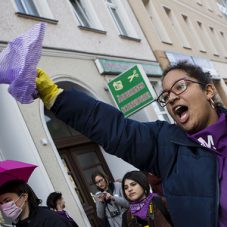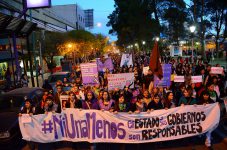| A Feminist International? How Women Organize Across Borders

The images of the 8 March 2018 demonstrations in Spain evoked surprise and excitement all over Europe. Thousands of demonstrators—predominantly women and queers of all ages—turned the streets into torrents of purple, occupied universities, held assemblies, and brought public transport to a standstill while singing joyfully. Some five million people took part in a nationwide feminist strike from paid and unpaid work alike. The event was not just the biggest feminist mobilization, but also the biggest strike ever recorded in Europe.
| mehr »









